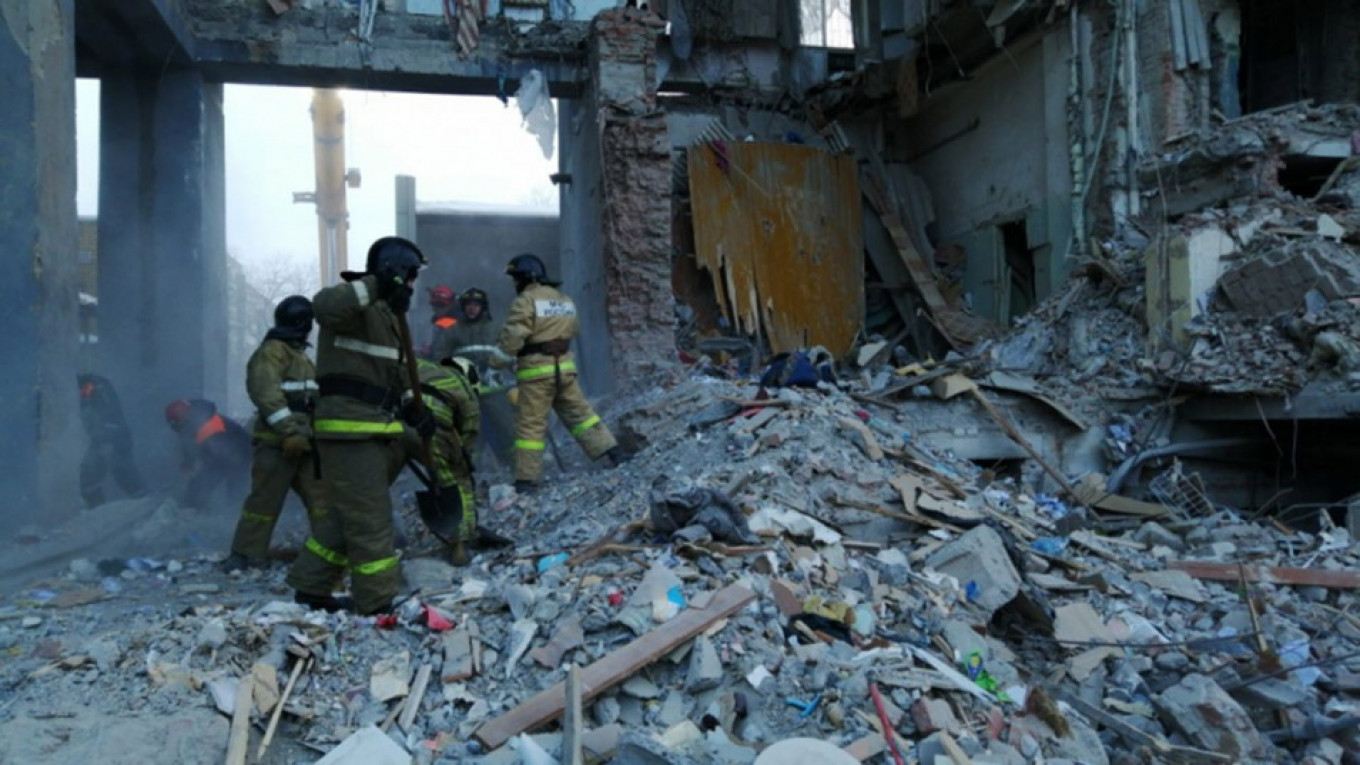The Russian public has shown little interest in blaming terrorism for the Dec. 31 explosion in Magnitogorsk that destroyed an entire section of an apartment building and claimed the lives of 39 residents. And that is despite the fact that rumors of foul play were laced with references to the politically toxic word “hexogen.”
Unlike in 1999, it is easier now for people to attribute the blast to the banal negligence and carelessness of local inhabitants than to the politically-tinged motive of ruthless terrorism. In fact, the FSB announced within 24 hours that nothing other than an ordinary gas explosion had taken place. And although the Investigative Committee said it was considering all possible causes, preliminary results indicate that investigators have found no traces of explosive materials on the fragments of the collapsed building.
The situation itself and subsequent official statements were not unusual: what made this case different were the rumors on social networks and reinforced by several media outlets in the Urals that investigators had found traces of the hexogen explosive in the rubble. Russians are familiar with hexogen as the substance supposedly behind a series of explosions in apartment buildings in a handful of cities that claimed the lives of more than 300 people in 1999.
Interestingly, the uproar over the Magnitogorsk explosion died down on its own in just a few days — the authorities didn't have to exert any special effort to stifle it. This might be because President Vladimir Putin flew to the scene quickly, without the delay that had attended the government’s response to a similar tragedy — the shopping mall fire in Kemerovo last year. Or it might be because the whole country descends into a sort of suspended animation over the holidays.
In fact, reports of household gas explosions have become almost routine in Russia. In 2018, prior to the tragedy in Magnitogorsk, the country had experienced 12 deadly household gas explosions that took the lives of 20 people, including seven children. The explosions occurred in a wide-array of places including a military camp in the Vladimir region, St. Petersburg and the Moscow region. Those explosions occurred both in smaller private homes and high-rise apartment buildings.
Sadly, this has become a fact of life in a country where approximately 70 percent of all housing is equipped with gas stoves. Homeowners and tenants are themselves responsible for using gas appliances safely, but judging from the number of explosions, government oversight falls short of the danger posed by their failure to do so.
It is not necessary to be a terrorist to kill several people with a gas explosion: one need only ignore standard safety precautions. In the end, negligence and carelessness kill with greater regularity than terrorists do.
Maria Zheleznova is a columnist at the Vedomosti business daily, where this article was originally published in Russian. The views and opinions expressed in opinion pieces do not necessarily reflect the position of The Moscow Times.
A Message from The Moscow Times:
Dear readers,
We are facing unprecedented challenges. Russia's Prosecutor General's Office has designated The Moscow Times as an "undesirable" organization, criminalizing our work and putting our staff at risk of prosecution. This follows our earlier unjust labeling as a "foreign agent."
These actions are direct attempts to silence independent journalism in Russia. The authorities claim our work "discredits the decisions of the Russian leadership." We see things differently: we strive to provide accurate, unbiased reporting on Russia.
We, the journalists of The Moscow Times, refuse to be silenced. But to continue our work, we need your help.
Your support, no matter how small, makes a world of difference. If you can, please support us monthly starting from just $2. It's quick to set up, and every contribution makes a significant impact.
By supporting The Moscow Times, you're defending open, independent journalism in the face of repression. Thank you for standing with us.
Remind me later.







